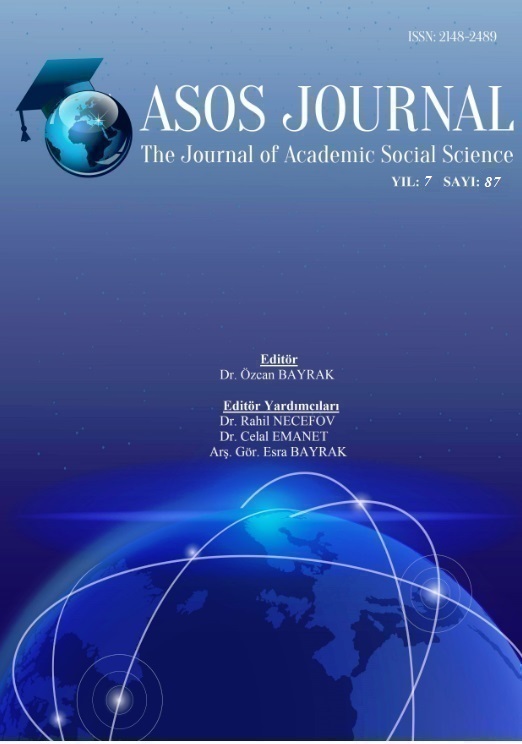Author :
Abstract
Gelenek kavramı, bir toplumun değerler sisteminden davranış biçimlerine, topluluk ilişkilerinden örf ve adetlere, düşünce yapısından alışkanlıklara kadar oldukça geniş bir kapsama alanına sahiptir. Kuşaktan kuşağa aktarıldığı için maddi ve manevi bir birikimi ifade eden geleneğin kendini koruma refleksi ile yenilik ve değişim olgusu arasındaki çatışma hali, insanlık tarihi ile koşuttur. Değişim isteğine karşılık geleneğin devamlılığını sürdürme yönünde ortaya koyduğu iradenin pek çok alanda olduğu gibi şiirde de yansımaları olmuştur. Edebiyatımızda yenileşme hareketinin yoğun olarak görüldüğü Tanzimat devriyle birlikte gelenekten uzaklaşma eğilimlerinin başladığı söylenebilir. Ancak Cumhuriyet Dönemi’nden itibaren hatırı sayılır bir kadro yıllarca bir kenara itilen, aşağılanan ve hatta yok sayılan geleneği yeniden odağa alır. Bu şairlerden biri de Türk şiirinin başlangıcından günümüze ayrılmaz bir bütün olduğunu düşünen Haydar Ergülen’dir. Ergülen geçmişle bağını koparmış bir şair ya da şiirin kalıcı olamayacağına inanır. Bu nedenle yazdığı şiirlerde Halk ve Divan edebiyatı geleneğinin şekil, ahenk ve söyleyiş özelliklerine sıklıkla yer vermiş; şiirine geçmiş ile gelecek arasında bir köprü kurma işlevi yüklemiştir. Ancak Ergülen’in şiirlerinde kendine yer bulan bu özelliklerin varlığı geçmişi taklit etmekten ziyade geleneksel olanı günümüze uyarlama, yeniden yorumlama ve modern bir terkibe ulaşmaya yöneliktir. Bu çalışmada Haydar Ergülen’in bütün şiirleri gelenek, geleneksel unsurlar ve bu unsurlara ne ölçüde yer verildiğinin tespit edilmesi amacıyla incelenmiştir. Bu nedenle öncelikle gelenek olgusunun kavramsal çerçevesi genel hatlarıyla çizilmiş daha sonra Ergülen’in gelenek konusundaki düşüncelerine yer verilmiştir. Çalışmanın asıl bölümünü teşkil eden kısımda ise Ergülen’in şiirleri ‘Geleneksel Muhteva Unsurları, Zevk ve İmge Dünyası’ ve ‘Geleneksel Şekil ve Ahenk Unsurları’ olmak üzere iki başlıkta değerlendirilmiştir.
Keywords
Abstract
The concept of tradition covers a wide span of topics, ranging from the system of values held by a people to their behavior patterns, from their mentality to their habits. Traditions, handed down from generation to generation, are an expression of spiritual and material accumulation and have a self-preservation reflex. The conflict between this impulse and the idea of novelty and change can be found throughout human history. The determination of traditions to continue their existence against the push for change has had repercussions in poetry, as it has had in many other areas. There was a tendency to break away from tradition in our literature during the Ottoman Reformation Era, which also marked the start of an extensive innovative trend in literature. Yet, having been pushed aside, disrespected, and ignored, the tradition became the focus again starting with the Republic Era, thanks to some respectable people in the field. One of these people was the poet Haydar Ergülen, who thought that Turkish poetry, from its beginning to present day, was an inseparable whole. He believed that a poet or a poem detached from the past could not survive. That is why, in his poetry, he often employed the form, rhythm, and diction features of the folk literature as well as the classical Ottoman poetry tradition. His poetry served as a bridge between the past and the future. However, the existence of these features in Ergülen's poetry was not a mere imitation of the past, but rather an adaptation to the current day, a reinterpretation, and a modern blend. In this paper, all of Haydar Ergülen's poems were studied with the intention of determining their tradition, traditional elements, and how much these elements were employed. To this end, first, the concept of tradition was defined in general terms, followed by a discussion of Ergülen’s views on tradition. In the body part, Ergülen's poems were appraised under the two following categories: "Traditional Content Elements, Pleasure and Imagery World" and "Traditional Form and Rhythm Elements."





